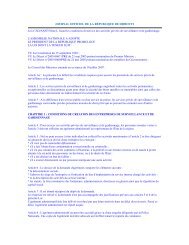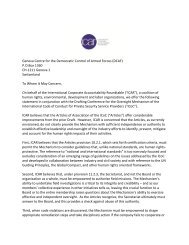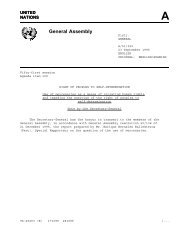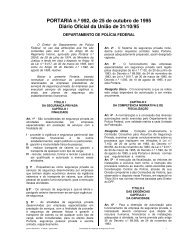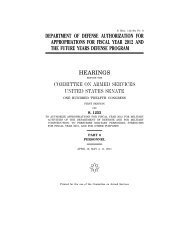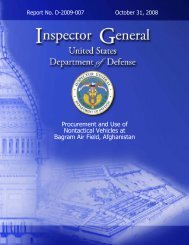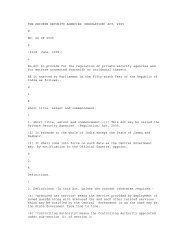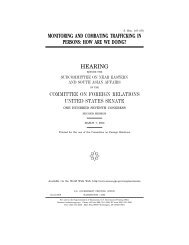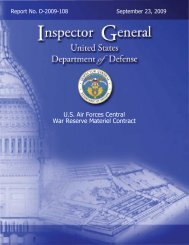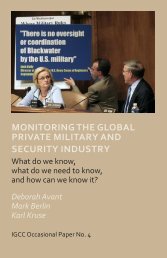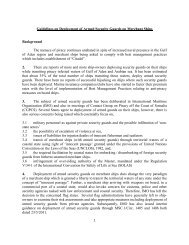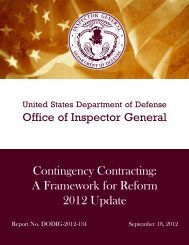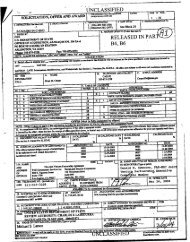PMSC Workshop Jan. 06 - Chair's Summary - Private Security Monitor
PMSC Workshop Jan. 06 - Chair's Summary - Private Security Monitor
PMSC Workshop Jan. 06 - Chair's Summary - Private Security Monitor
You also want an ePaper? Increase the reach of your titles
YUMPU automatically turns print PDFs into web optimized ePapers that Google loves.
<strong>Workshop</strong> of Governmental Experts and Industry Representativeson <strong>Private</strong> Military / <strong>Security</strong> Companies16-17 <strong>Jan</strong>uary 20<strong>06</strong>, Zurich, Switzerland<strong>Summary</strong> of the Chair1 September 20<strong>06</strong>On 16 and 17 <strong>Jan</strong>uary 20<strong>06</strong>, the Swiss Federal Department of Foreign Affairs, in cooperationwith the International Committee of the Red Cross (ICRC), convened a workshop on privatemilitary / security companies (PMCs/PSCs) operating in conflict areas. Governmental expertsfrom Austria, Canada, France, Germany, South Africa, Switzerland, Ukraine, the UnitedKingdom and the United States of America participated in the workshop. Also taking partwere representatives of the ICRC and, on the first day of the workshop, industryrepresentatives, namely from the United Kingdom and the United States industryassociations and two companies, as well as two independent experts. Participants expressedtheir views in their personal capacity.The workshop constituted a first step of the inter-governmental initiative launched bySwitzerland, in cooperation with the ICRC, to promote respect of international humanitarianlaw and human rights law with regard to PMCs/PSCs operating in conflict situations. Asstated in the annexed Outline, the objectives of this initiative are:1. to contribute to an inter-governmental discussion on the issues raised by the use ofPMCs/PSCs;2. to reaffirm and clarify the existing obligations of states and other actors underinternational law, in particular under international humanitarian law and human rightslaw;3. to study and develop options and regulatory models as well as other appropriatemeasures at the national and possibly regional or international level and4. to develop, on the basis of existing obligations, recommendations and guidelines forstates to assist them in meeting their responsibility to respect and ensure respect forinternational humanitarian and human rights law, including by national or regionalregulation.Format of the MeetingThe workshop was intended to be an informal occasion for governmental experts to engagein a dialogue among themselves and with representatives of the industry, to shareexperiences and to discuss possible ways of promoting respect for international law withregard to the operation of PMCs/PSCs in conflict situations. On the basis of the abovementionedobjectives of the initiative, the meeting also aimed at identifying issues that mayneed to be addressed.The first day of the workshop was devoted to a general presentation of the phenomenon andof the existing national and international legal framework in which PMCs/PSCs operate (seethe annexed Agenda). Industry representatives then outlined steps they were taking, eitherindividually or through industry associations, to promote "best practices". The second daywas a forum reserved for government representatives to discuss issues that had been raised
2on the previous day; means by which they could be addressed; possible and meaningfulelements of national regulation and model contracts; and possible ways forward at thenational, regional and/or international level.Relevant International LawAt the beginning of the workshop, several speakers outlined relevant areas and rules ofinternational law (see presentations annexed). One central conclusion of the discussion onthe applicable law was that international legal obligations cannot and must not becircumvented by states through the use of PMCs/PSCs.Relevant international legal rules which cannot be circumvented by hiring PMCs/PSCsinclude for instance the prohibition of the use of force against another state, a cornerstone ofinternational law. States also have the duty not to intervene in the internal affairs of any otherstate. While some states are bound by the AU Convention of 1977 for the Elimination ofMercenarism in Africa and the UN Convention of 1989 against the Recruitment, Use,Financing and Training of Mercenaries, there is no universal prohibition of mercenarism.Most staff of PMCs/PSCs do not fit the definition of “mercenaries” contained in Article 47 ofthe 1977 Additional Protocol I to the Geneva Conventions. Since the issue of mercenarismthus relates only to a small part of the contemporary phenomenon of PMCs/PSCs, there wasgeneral agreement that it should not be the focus of the initiative. States however remain free(subject to other international obligations) to outlaw certain activities of PMCs/PSCs.The speakers furthermore underlined the obligation of states to respect and ensure respectof international humanitarian law and international human rights law. This obligation isrelevant not only for states contracting PMCs/PSCs, but also with regard to states on whoseterritory PMCs/PSCs operate and states in which PMCs/PSCs are incorporated.States that contract PMCs/PSCS have some clear responsibilities: first, they cannot absolvethemselves of their obligations under international law by hiring PMCs/PSCs; secondly, theymust ensure respect for international law by the PMCs/PSCs they contract; thirdly, they areresponsible for violations of international law committed by the PMCs/PSCSs that can beattributed to them; and, finally, like all states, they must investigate and, if warranted,prosecute violations of, most particularly, international humanitarian law alleged to have beencommitted by the staff of PMCs/PSCs – an obligation that applies a fortiori if they have hiredthe company.International law traditionally regulates inter-state relations and does not typically addressprivate actors. However, certain rules of international law, not least in armed conflictsituations, are of direct relevance to the activities of the staff of PMCs/PSCs. Internationalhumanitarian law as well as international criminal law establish clear obligations forindividuals, including employees of such companies. However, international humanitarianlaw only applies in situations of armed conflict, be it of an international or non-internationalcharacter. International human rights law (e.g. the UN Covenant on Civil and Political Rightsof 1966) and soft law standards (e.g. the UN Code of Conduct for Law Enforcement Officialsof 1979 or the UN Basic Principles on the Use of Force and Firearms by Law EnforcementOfficials of 1990) may also be of relevance to the activities of PMCs/PSCs. Moreover,individuals who commit serious violations of international humanitarian law or grossviolations of human rights may incur criminal responsibility directly under international lawand may be prosecuted by national or international tribunals.While the existing legal framework addresses many issues raised by PMCs/PSCs, a keychallenge remains to ensure respect of the relevant international humanitarian law andhuman rights standards by all relevant actors as a matter of practice.
3Measures Taken by the Industry to Promote Respect for International HumanitarianLaw and Human RightsIndustry representatives presented measures taken by their companies to ensure andpromote respect for international law, including vetting procedures and modalities in therecruitment process, training in human rights and international humanitarian law, adoption ofclear operating procedures and rules of engagement, internal disciplinary systems, and therejection of contracts that might involve illegal activities. Industry associations are currentlyworking on establishing standards and procedures to self-regulate the provision of privatesecurity services.DeliberationsGeneral AspectsThe workshop was welcomed by participants as the first time governmental experts werebrought together to discuss issues relating to PMCs/PSCs and respect for internationalhumanitarian law and human rights.During the first session of the workshop, it was underlined that the use of PMCs/PSCs inconflict situations as well as in post-conflict situations and in states lacking effective securitysector institutions) is not a new phenomenon. What is new, are their numbers as well as thenature of their activities. Today, companies are being used for typical security functions suchas the protection of personnel and property of governments, international organisations, nongovernmentalorganisations, and, not least, other private industry and business in high-threatenvironments, including international and non-international armed conflict. In addition, theyhave provided tasks such as setting up military logistics, servicing weapons’ systems,collecting intelligence, manning check-points, protecting military convoys and other servicesthat may result in direct participation in hostilities, whether intended or not. Participantsagreed that PMCs/PSCs are likely to remain a reality on the ground and that thephenomenon is likely to increase in importance.When identifying the issues to be discussed and the standards to be respected and ensuredby a particular company, participants did not focus much on whether a specific firm could belabelled as a “private military company” or a “private security company”, but rather on whatservices the company provided. Several participants reflected on how to define the servicesfor which standards and potential regulation should be discussed.While several participants pointed out that the delegation of certain tasks in conflict situationsto private military and security companies may be beneficial to the communities and nationsaffected by the conflict, it was also mentioned that the use of private companies for theprovision of military or security services may lead to a loss of accountability and politicallegitimacy and weaken the state’s control over the legitimate use of force. The delegation oftypical state functions to private actors may in some cases weaken state-building efforts andstate institutions and more generally undermine the notion of security as a public good. Suchadverse effects should be considered and limited as much as possible. Also, private actorshave been resorted to at times to carry out prohibited activities such as the unlawful use offorce against another state by proxy. Several participants underlined that the delegation oftasks that may involve the use of deadly force or weapons to private actors requiresparticular attention and needs to be regulated and controlled to ensure proper conduct andaccountability. Yet, many states concerned by the phenomenon do not have any nationalregulation on PMCs/PSCs.Some participants pointed out that reliable empirical facts and studies on the phenomenonstill are scarce and that further empirical research would be useful. Also, few studies had
4been carried out on the effects of the use of such companies and on their conduct on theground, including with regard to the affected population and respect of internationalhumanitarian law and international human rights law. One particular issue raised in thisrespect was that the affected population is frequently unable to identify the staff of thePMCs/PSCs, which makes it difficult to complain about alleged misbehaviour and elucidatefacts. A further question identified by some participants as a useful topic for further researchwas the applicability of international human rights law and standards and potential stateresponsibility for violations of international standards by PMCs/PSCs. Some participants alsoraised the idea of developing model contracts and study “best practices” of companies aswell as states and possibly other actors contracting such companies (international and nongovernmentalorganisations, companies).RegulationThe need for regulation of the private military and security industry was extensively debated,with participants emphasizing the potential for enhancement of the governmental control overthe activities of PMCs/PSCs. The adoption of appropriate national (and possibly regional)regulation with regard to the operation of PMCs/PSCs in conflict situations was identified asa possible means helping states to comply with their obligations under international law andin particular the obligation to respect and ensure respect for international humanitarian lawand international human rights law.Regulation may be considered more particularly by states that contract such companies,states on whose territory they operate, and states in which such companies are incorporated.Yet, only few states have relevant legislation regulating the provision of private military orsecurity services abroad and/or laying down procedures for licensing or authorizingPMCs/PSCs to operate. However, several governments currently contemplate regulating theindustry. Also, governments as well as other clients of transnational private military orsecurity services reflect on appropriate standards for contracting PMCs/PSCS. Presentationsby experts from states with relevant national regulation and from states that are consideringthe adoption of regulations provided an opportunity to exchange experiences and views.A preliminary question any regulator will need to address is how to define the services to beaddressed by regulation and whether the provision of certain services should be excluded.Another issue raised was how to ensure appropriate accountability and monitoring (by whatbody, what to monitor, how should affected individuals be enabled to file complaints andidentify wrongdoers).Participants reflected on options of elements of regulation. With regard to states that contractsuch companies, possible steps such as the following were brought up:- determination of which activities may or may not be outsourced;- requiring the company by the terms of the contract:o to vet its employees;o to train its employees in international humanitarian and human rights law, bothgenerally and in a context- and task-specific manner in accordance withspecific contract;o to adopt standard operating procedures and rules of engagement incompliance with international law and in accordance with their mandate underthe contract;o to provide for internal disciplinary sanctions and to take measures to allowaffected persons to complain about misconduct; ando to obtain the approval of the contracting state for any sub-contracting ofcontract tasks;
5- inclusion in the contract of a reminder of accountability for violations of internationalhumanitarian law and international human rights law;- measures to monitor performance and enforce compliance with the contract and thelaw, including supervision of performance; sanctions for violation of the contract suchas termination, barring from bidding again, or contract penalties; and ensuring there isa system to bring to justice alleged perpetrators of crimes, in particular internationalcrimes.The above elements might provide recommended elements also for the hiring ofPMCs/PSCs by entities other than states, such as transnational companies, internationalorganisations and non-governmental organisations.With regard to states on whose territory PMCs/PSCs operate, options of elements of nationalregulation that were mentioned included:- a requirement to obtain a general operating licence for companies to providespecified security/military services on the state’s territory;- determining specific activities that PMCs/PSCs can be licensed to carry out within thestate’s territory;- conditions for the approval of licenses for specific activities (e.g. context- and taskspecifictraining of personnel; standard operating procedures and rules ofengagement in compliance with international law; permissible tasks and weapons,including provisions for the legal acquisition of weapons; internal disciplinary systems;re-affirmation that the law must be respected etc.);- establishing systems for monitoring compliance and measures to promotetransparency;- sanctions for operating without registration or license or in violation thereof; and- establishing mechanisms for holding perpetrators of crimes accountable under law.Several of the above-mentioned elements with regard to territorial states were considered aspotentially relevant in a regulatory framework that could be adopted by the states ofincorporation of PMCs/PSCs offering services in conflict situations abroad. Such ‘homestates’ of PMCs/PSCs are those from which private military or security services are“exported” – to other states or to international non-state clients such as transnationalcorporations, non-governmental organisations or international organisations. As is the casefor controls established over the export of military goods and weapons, such states couldestablish means for controlling the international transfer of military or security servicesthrough national regulation (export controls). It was also suggested that such controls wouldbe co-ordinated at the regional level, following models such as the European Union’s Codeof Conduct on the Export of Arms.Participants also discussed the idea to further study options of regulatory models and todevelop, on the basis of existing obligations, recommendations for states relating to possibleelements of national (or other) regulation and contracts. How such recommendations wouldbe implemented at the national level and how the national regulation would be conceivedcould in principle be left in the competence of the states.The Swiss initiative in cooperation with the ICRC is primarily addressed to states. However,standards would also usefully be considered and elaborated for the contracting ofPMCs/PSCs by entities other than states. Initiatives in this regard and other measures suchas self-regulation by the industry appear to be useful complementary approaches and arecurrently being considered. Addressing the issues raised by PMCs/PSCs from differentangles and in different fora can promote complementary and mutually reinforcing layers ofcontrol and regulation.
6ConclusionsParticipants welcomed the initiative and encouraged the organizers to pursue it and facilitatefurther inter-governmental exchange on the issue. Similar indications had been received inconsultations prior to the workshop, including from governmental experts from countries onwhose territories PMCs/PSCs had been or were still operating.Participants agreed that states have obligations under international law that cannot becircumvented by the use of PMCs/PSCs. Relevant obligations include the prohibition of theuse of force and the prohibition of interference in the internal affairs of another state as wellas obligations under international humanitarian law and international human rights.Participants concurred in principle that there may be a role for regulation to address currentissues with regard to the transnational use of PMCs/PSCs. Appropriate regulation may helpstates to heed their obligations under international law and, more particularly, promote betterrespect of international humanitarian law and human rights. Participants expressed aninterest to discuss regulatory options and possible standards on an intergovernmental basis.Next StepsSwitzerland, in cooperation with the ICRC, will pursue its initiative on the basis of theanalysis and objectives reflected in the attached outline and strive to facilitate further intergovernmentalexchange on the issue. Documents and additional information are available onthe initiative’s website (www.eda.admin.ch/psc).Following the workshop, consultations with interested governments as well as otherstakeholders and experts will be continued and broadened, including on potential endproducts of the process and appropriate fora for deliberating and, possibly, adopting suchproducts.A meeting of governmental experts from a larger number of states is planned for November20<strong>06</strong>.A possible forum for discussion of certain aspects of the initiative and, possibly, their furtherdevelopment may be the International Conference of the Red Cross and Red CrescentMovement scheduled to take place in November 2007.Best regards,Paul Seger



